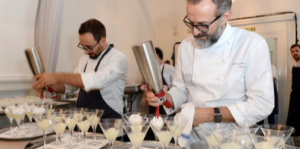
Italian chef Massimo Bottura(right) is leading the efforts to cook meals for Rio’s homeless people. Screen Grab from Twitter/@MassimoBottura
Chef Massimo Bottura might not be among the athletes competing in the 2016 Olympic Games, but he certainly deserves a gold medal for his effort to eradicate hunger in the poorest streets of Rio de Janeiro.
The 53-year-old Italian restaurateur is leading “RefettoRio Gastromotiva,” a project of international chefs who cook surplus food donated by the Olympic Village and serve it to impoverished residents.
“I thought this is an opportunity to do something that can make a difference,” the acclaimed chef and owner of one of Italy’s best restaurants, Osteria Francescana, said.
The chefs produce around 5,000 meals a day using only the donated ingredients, the New York Times reported.
“RefettoRio Gastromotiva is going to work only with ingredients that are about to be wasted—like ugly fruit and vegetables, or yogurt that is going to be wasted in two days if you don’t buy it,” one of the volunteers, Brazilian Chef David Hertz, clarified. “We want to fight hunger and provide access to good food.”
Boturra has begun assigning over 50 chefs to different shifts since last week, including celebrity cooks like Alain Ducasse, Virgilio Martínez Véliz and Joan Roca.
True to their revered culinary form, the chefs weren’t producing simple dishes either. Famed Brazilian chef Alex Atala managed to create an Italian-style couscous with sautéed beef and panzanella out of the donated ingredients, a dish that could have been served in the finest 5-star restaurants.
Gastromotiva, meanwhile, will continue through the duration of the Olympics and Paralympic Games, after which it will function as a “social business,” Hertz said in the report. The business will also provide vocational training for aspiring restaurant professionals, including cooks, bakers and servers.
The 31st Olympic Games in Brazil’s capital has faced major criticism, as the country continues to struggle through a massive economic crisis.
Rio’s homelessness has risen 2% to 3% a year, with around 16,000 displaced individuals counted in a recent census. Additionally, several soup kitchens have either closed or decreased their food offering due to low state funding.
Boturra, on the other hand, understands the severity of the problem and said his the act was symbolic of a larger message.
“This is not just a charity; it’s not just about feeding people,” he was quoted as saying in the report. “This is about social inclusion, teaching people about food waste and giving hope to people who have lost all hope.” Khristian Ibarrola